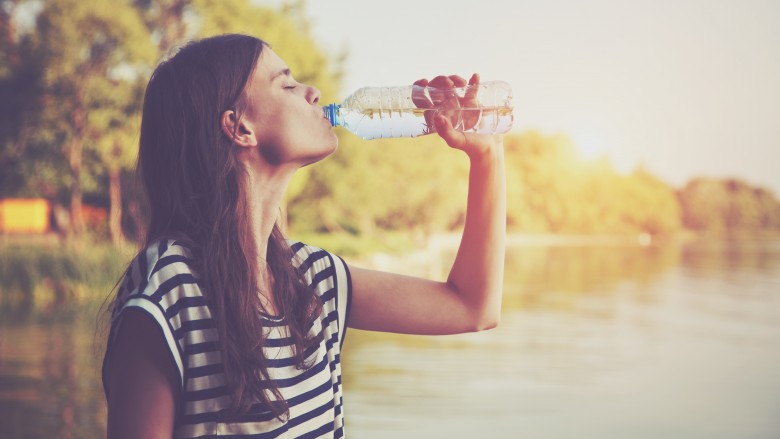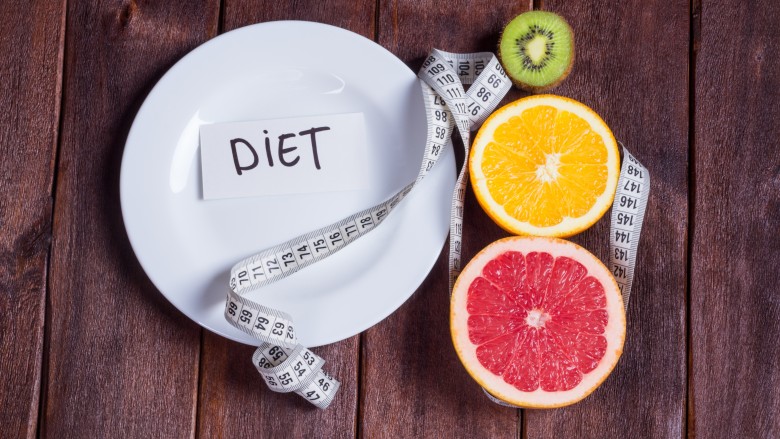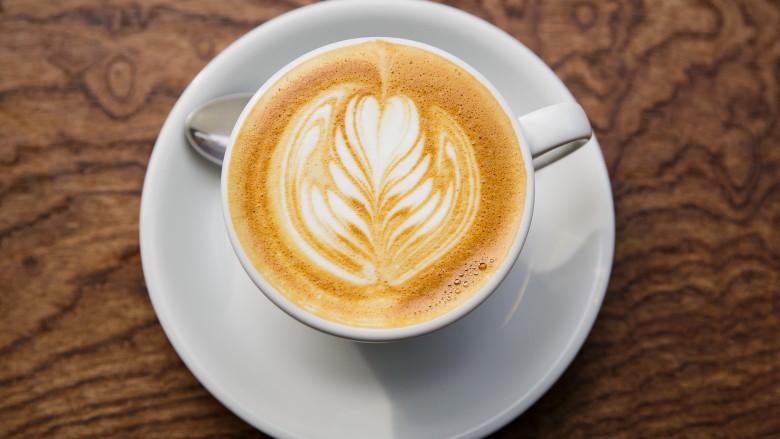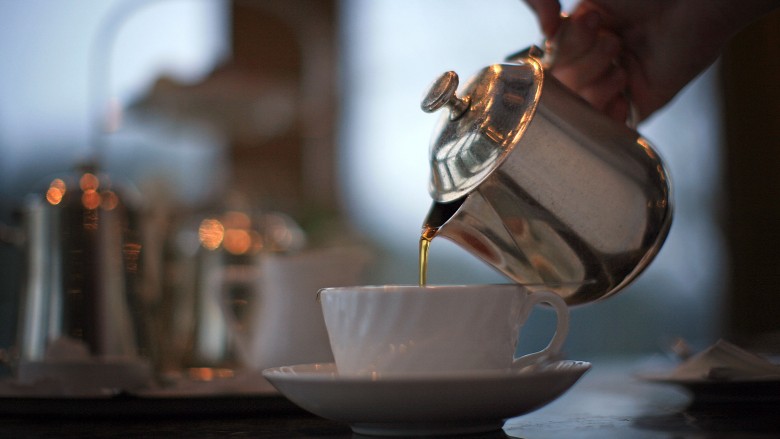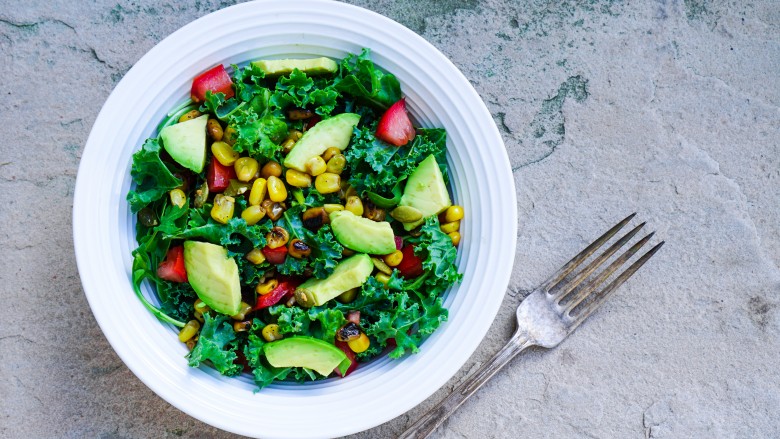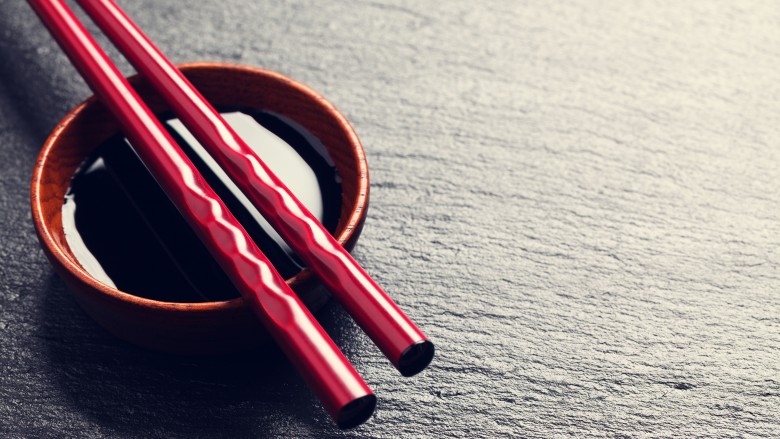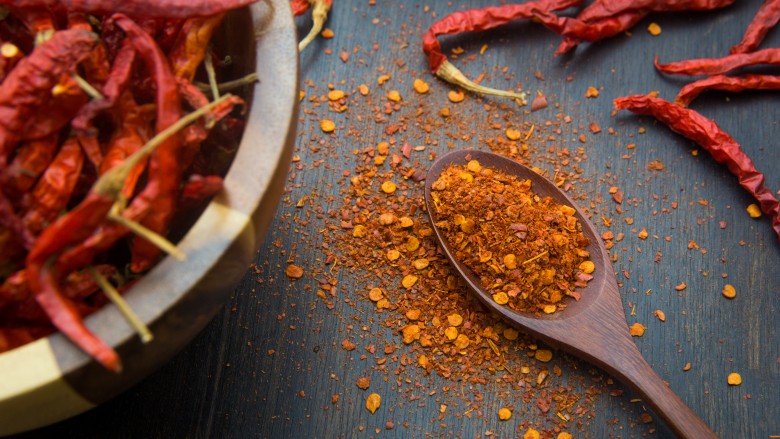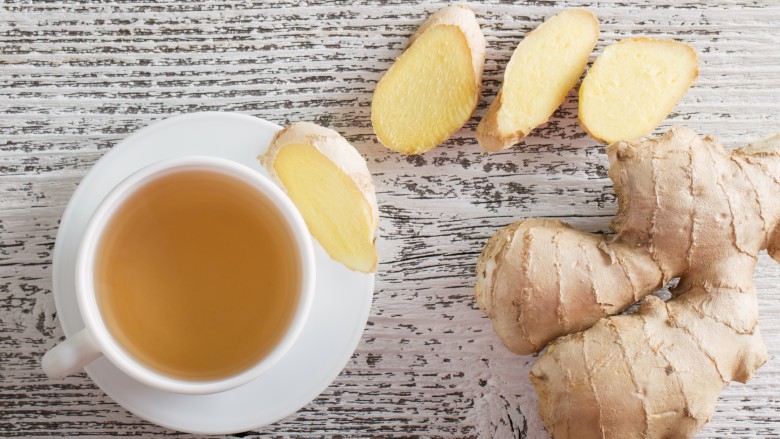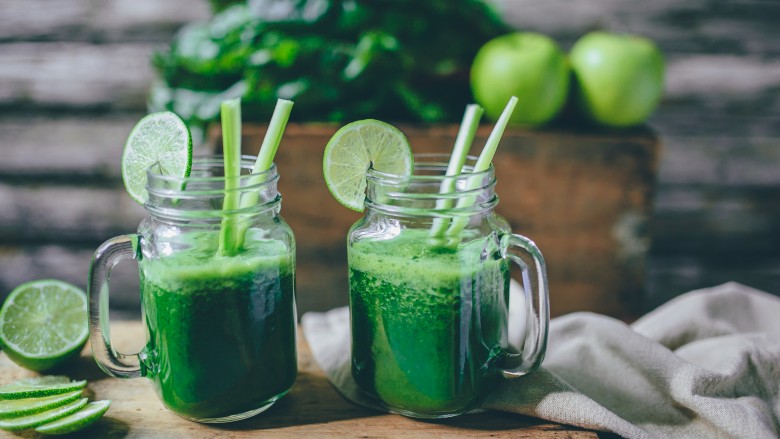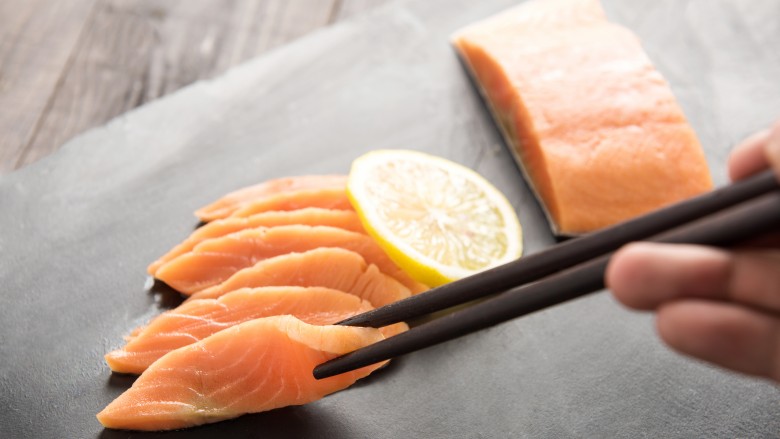Food Fix Secrets For Headaches
We may receive a commission on purchases made from links.
If there's one thing everyone on this planet can agree on, it's that headaches are the actual worst. They're totally unpredictable — headaches can strike at any time and for a ton of different reasons, so preventing and treating them isn't easy. Next time you just can't shake that pain behind your eyes, ditch the Advil and try these natural food fix secrets for headaches instead.
Stay hydrated
Although it sounds totally crazy, human beings are mostly made of water. So weird to think about, but true! The exact percentage of water make-up varies from person to person, but one thing is for certain: water is incredibly important to survival. According to the United States Geological Survey, water is integral for things like regulating body temperature, keeping your joints moving, and "acting as a shock absorber" for the brain and spinal cord. When you don't drink enough water, you deprive your body of its most essential building block, which stresses your body out and leads to headaches.
Dietitian and nutrition blogger Andy De Santis told me that women should strive for at least nine cups of water per day, "and more if you are physically active."
If you're not a fan of water (it's boring and tasteless, okay?!), there are a couple hacks that'll supplement your water intake. Smoothies are a great way to get the water and nutrition your body needs (registered dietitian Jessica Cording recommends this creamy chocolate wild blueberry smoothie), as well as watermelon, which is 92 percent water and also "provides important electrolytes that can help ease a headache," said Cording.
Don't skip meals
Just as not getting enough water can cause headaches, so can not getting enough food. Whether you're dieting, skipping a meal because you ate a little too much cake before bed last night (no judging!), or just forgot to each lunch, skipping a meal can lead to a drastic drop in blood sugar levels. According to the Go Ask Alice team of health professionals at Columbia University, low blood sugar "causes your body to release hormones that are compensating for depleted glucose levels." From there, you're looking at an increased blood pressure that "can narrow your arteries" and lead to a pounding headache — and make you hangry!
Drink coffee
Raise your hand if you're not a morning person! For many of us, even just the thought of starting a day without a little caffeine fix causes a headache. Luckily, nutritionist Tehzeen Lalani told me that those who are prone to headaches have an ally in coffee.
"Caffeine is a vasoconstrictor, which means it can reduce the size of blood vessels," Lalani said. If your headache is an allergy symptom, coffee is your new best friend. "Coffee can reduce the release of histamine in your blood," according to Lalani. "This allergy-fighting superpower comes from the high antioxidants, or phytochemicals, in coffee which is a plant-based food that protects our cells from free radical damage."
DON'T drink coffee
I know, I know. This is confusing, because I literally just told you that coffee is a headache reliever. As it turns out, that's not always the case. "Certain foods contain substances that may have an effect on constricting or expanding blood vessels in our brains," German Nutrition Society (DGE) certified nutritionist Hartje Andresen explained to me, "and thus can cause, trigger, or aggravate migraine attacks." Unfortunately, coffee is one of these.
Here's the thing: while coffee and other versions of these foods (like alcohol, chocolate, and cheese — all the good stuff) might make you feel better at first, Andresen said that it's "the combination of the foods in addition to other factors like stress, lack of sleep, irregular schedule, or strong emotions, that will cause a migraine attack." Bummer. Instead, Andresen suggests eating things like apples, pears, cherries, grapes, and apricots throughout the day to help regulate your blood sugar level and keep headaches at bay.
Drink more tea
If you're like me and can't start your morning without a warm drink but are totally confused by the whole coffee/no coffee thing, try replacing your coffee with tea. Namita Nayyar, president of Women Fitness, told me that peppermint and chamomile are two flavors of tea that work wonders on headaches.
For migraines, Nayyar suggests peppermint tea, while those with tension headaches will find relief from chamomile, which "has anti-inflammatory and pain relieving properties and helps to ease emotional tension."
Add more magnesium to your diet
When you think about all the vitamins and minerals you need on a daily basis, chances are magnesium isn't even on your radar. Even though it's not something you hear about every day, magnesium is a proven headache fighter. "Of the different supplements that have been reviewed in the treatment of migraines, my impression is that magnesium (~400-500mg a day) is the most effective," dietitian and nutrition blogger Andy De Santis told me.
So, how does this miracle mineral work, you ask? Carolyn Dean, MD, stress management expert and author of The Magnesium Miracle explained, "magnesium prevents platelet aggregation, which helps to avoid the thickened blood and tiny clots that can cause blood vessel spasms and the pain of a headache." This is great news for women who experience period-related headaches," nutritionist Hartje Andresen added.
Even better, magnesium "relaxes the head and neck muscle tension that makes headaches worse." The best part is it's super easy to add more of this headache fighter to your diet. According to Dean, "dark leafy green vegetables such as kale and spinach are chock full of magnesium," as are raw nuts and seeds.
Avoid Asian sauces
Sorry, Asian food lovers, but some of your favorite sauces might trigger headaches. In fact, the discomfort caused by such foods is so common it actually has a name: "Chinese Restaurant Syndrome." The biggest problem lies in the sauces found in these foods, like soy sauce and teriyaki sauce, explained dietitian and nutrition blogger Andy De Santis. "These sauces generally contain MSG and tyramine, two compounds known to potentially trigger migraine symptoms," he told me.
Alan Rapoport, MD, founder and Director-Emeritus of the New England Center for Headache in Stamford, Connecticut told Prevention, "We think MSG is toxic to the brain and actually triggers the electrical dysfunction in the brain that starts the migraine process."
While some research has shown that MSG sensitivity can lead to headaches in some people, the threshold that seems to cause symptoms is much higher than what the average person consumes. While the findings have been mixed, at the end of the day if eating Asian sauces seems to make your headaches worse, it's probably best to cut them out. That doesn't mean you have to give up your favorite food forever, though — next time you order, just ask the restaurant to prepare your meal without MSG.
Eat spicy foods
The next time you're wondering what kind of food you want that won't lead to a headache, skip the Asian food and go with Mexican. While Asian sauces might trigger a headache, the ingredients in hot sauce help relieve it!
Namita Nayyar, president of Women Fitness, told me that cayenne pepper contains capsaicin, "which among other things seems to raise the pain threshold." According to Nayyar, capsaicin has recently become useful in the medical world "for its treatment of cluster headaches and it's often given in the form of a nasal spray."
If you ask me, nasal spray is nowhere near as fun as eating tacos loaded with spicy sauce, but to each their own.
Cook with ginger or turmeric
One reason headaches are so hard to treat is that there are so many different causes. As licensed chiropractor, certified clinical nutritionist, and CEO of Blue Sky Vitamin Ron Ledoux told me, inflammation is one of these culprits. He suggests consuming "foods and supplements containing anti-inflammatory properties."
Ginger is notable for its pain relieving properties, so cooking with ginger or turmeric herbs is beneficial (which means more Indian food!). If you're not a fan of the taste, Ledoux says turmeric supplements will also do the trick.
Make a green smoothie
Going out for happy hour drinks is all fun and games until you wake up the next morning with a hangover-induced headache. As you probably already know (thanks to the number of times you run to the bathroom during a night out), alcohol is a diuretic, Oliver James, deputy director at the Institute for Ageing and Health at Newcastle University, explained to Drink Aware.
Every time you pee, you're also losing water (which we now know causes headaches). If you don't re-hydrate before you pass out for the night, you're almost guaranteed to wake up feeling less than stellar. Have no fear: your hangover cure is here! Nutritionist Tehzeeb Lalani revealed to me that green smoothies in the morning are the key to battling hangover headaches.
"Blend together cucumber, apples, and spinach for a high water, high nutrient drink," she suggested. If green smoothies aren't your thing, Lalani said snacking on other high water foods like berries, tomatoes, and celery will help relieve headaches. You're welcome!
Eat less sugar
You know sugar isn't great for your waistline, but did you know it's also a headache inducer? "Headaches occur because your body has to adjust to a high influx of sugar entering the body thus rapidly changing the blood glucose levels," Dr. Konda Reddy of Physicians Weight Loss Orlando explained to me. "In response, our bodies send insulin to combat the influx thus dropping your blood sugar back down," and bam! Headache.
According to Dr. Reddy, cutting out "simple, refined sugars" like cake (sorry!), chips, and pasta is the best way to avoid this type of headache. He suggested replacing these foods with "a simple, whole food diet coupled with foods packed with probiotics."
Add more Vitamin D to your diet
One way to prevent headaches is to make sure your body's getting the recommended daily intake of major vitamins, including Vitamin D. According to registered dietitian Julia Levine Axelbaum, "Vitamin D is a fat soluble vitamin that is naturally found in very few foods and is mostly acquired through sun exposure."
However, those in rainier areas or people who don't spend a lot of time outside could suffer from a Vitamin D deficiency, which increases the risk of headaches according to a 2017 study by the University of Eastern Finland. Axelbaum told me that the best way to supplement your Vitamin D intake is through "the flesh of fatty fish such as salmon, tuna, and mackerel, and fish liver oils," as well as "beef liver, cheese, mushrooms, and egg yolks."
There's a food fix for every type of headache
Whether you suffer from chronic migraines, only get headaches around your menstrual cycle, or are battling a nasty hangover, your diet is a great way to take care of things naturally. Harold Walach, a professor of clinical psychology from Germany who has done a lot of research in complementary and alternative medical approaches, told me that there's no one-size-fits-all approach.
He suggested that no matter what approach you take, it's important to continue experimenting with your food choices, especially when the desired results aren't immediate. So stay hydrated and add (or remove!) these foods to your daily routine to stop a headache before it even starts.

